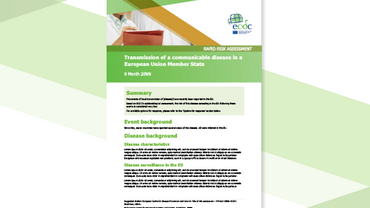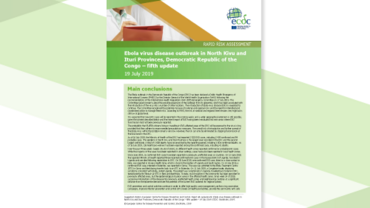Rapid Risk Assessment: Outbreak of Ebola virus disease in West Africa - Sixth update, 13 October 2014
This is the sixth update of the rapid risk assessment on the outbreak of Ebola virus disease in West Africa which considers the risk of importation and transmission of the disease in the EU associated with the outbreak currently affecting Guinea, Liberia, Sierra Leone and Nigeria.
Executive Summary
Since December 2013 and as of 8 October 2014, 8 397 cases of EVD, including 4 032 deaths have been reported by the World Health Organization (WHO) in affected countries (Guinea, Liberia, Sierra Leone and Nigeria).
On 6 October, the Spanish authorities reported a confirmed case of Ebola virus disease (EVD) in a healthcare worker who cared for a patient with Ebola infection repatriated to Spain. The ongoing investigation in Spain is providing information to further understand how the infection was transmitted to this healthcare worker. There is currently no evidence indicating that the healthcare-associated transmission resulted from a change in the transmissibility of the virus. The current recommended infection control measures remain appropriate, if strictly applied. While additional cases among the contacts of the infected nurse cannot be excluded at this time, it is considered extremely unlikely that the event will result in significant spread in Spain.
The evolving outbreak of EVD over the last weeks increases the likelihood that EU residents and travellers to the EVD-affected countries will be exposed to infected or ill persons. The risk of infection for residents and visitors in the affected countries through exposure in the community is considered low if they adhere to the recommended precautions.
Residents and visitors to the affected areas run a risk of exposure to EVD in healthcare facilities. The level of this risk is related to how well the infection control measures are being implemented in these settings and the nature of the care required. The risk of exposure to the Ebola virus is higher for healthcare workers who work in settings where appropriate infection control measures have not been fully implemented.
As the outbreak is still evolving and more staff is deployed in the affected countries to support the outbreak control, the risk of importation of EVD cases to the EU is increasing.
The risk of Ebola viruses spreading from an EVD patient who arrives in the EU as result of a planned medical evacuation is considered low. The transmission to a healthcare worker in Spain illustrates the connection between the outbreak in West Africa and the risk for the EU and further stresses the need to control the outbreak in West Africa.
If a symptomatic case of EVD presents in an EU Member State, secondary transmission to caregivers in the family and in healthcare facilities cannot be ruled-out. Once the possibility of EVD has been recognised and, healthcare providers have taken precautions to stop transmission, the risk of spread is reduced to a minimum.






